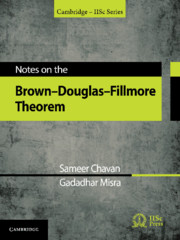Book contents
- Frontmatter
- Dedication
- Contents
- Preface
- From: The Evolution of Modern Analysis, R. G. Douglas
- Overview
- 1 Spectral Theory for Hilbert Space Operators
- 2 Ext(X) as a Semigroup with Identity
- 3 Splitting and the Mayer–Vietoris Sequence
- 4 Determination of Ext(X) as a Group for Planar Sets
- 5 Applications to Operator Theory
- Epilogue
- Appendix A Point Set Topology
- Appendix B Linear Analysis
- Appendix C The Spectral Theorem
- References
- Subject Index
- Index of Symbols
Overview
Published online by Cambridge University Press: 30 June 2021
- Frontmatter
- Dedication
- Contents
- Preface
- From: The Evolution of Modern Analysis, R. G. Douglas
- Overview
- 1 Spectral Theory for Hilbert Space Operators
- 2 Ext(X) as a Semigroup with Identity
- 3 Splitting and the Mayer–Vietoris Sequence
- 4 Determination of Ext(X) as a Group for Planar Sets
- 5 Applications to Operator Theory
- Epilogue
- Appendix A Point Set Topology
- Appendix B Linear Analysis
- Appendix C The Spectral Theorem
- References
- Subject Index
- Index of Symbols
Summary
A normal operator on a finite dimensional inner product space can be diagonalised and the eigenvalues together with their multiplicities are a complete set of unitary invariants for the operator, while on an infinite dimensional Hilbert space the spectral theorem provides a model and a complete set of unitary invariants for such operators (refer to Appendix C). Thus, we view the theory of normal operators to be well understood. It is natural to study operators that may be thought of to be nearly normal in some sense. One hope is that it would be possible to provide canonical models and a complete set of invariants for such operators. Since an operator is normal if [T, T*] := TT* − T*T is 0, one may say an operator is nearly normal if [T, T*] is small in some appropriate sense, for example, finite rank, trace class, or compact. In these notes, we will take the last of these three measures of smallness for [T, T*] and make the following definition.
An operator T in is essentially normal if the self-commutator [T, T*] of T is compact. We say that T is essentially unitary if T is essentially normal and T*T − I is compact. Let be the set of compact operators on a complex separable Hilbert space and be the natural quotient map. Set. An operator T in is essentially normal if and only if is normal in the C*-algebra. Further, an operator U in is essentially unitary if and only if is unitary.
One of the main goals of these notes is to describe a complete set of invariants for the essentially normal operators with respect to a suitable notion of equivalence. As we are considering compact operators to be small, the correct notion of equivalence would seem to be the following.
Two operators T1 and T2 in are said to be essentially equivalent if there exist an essentially unitary operator U and a compact operator K such that UT1U* = T2 + K. In this case, we write, T1 ~ T2. However, it turns out that one may replace the essentially unitary operator in this definition with a unitary operator without any loss of generality. The BDF theorem describes, among other things, the equivalence classes ﹛essentially normal operators﹜/*.
- Type
- Chapter
- Information
- Notes on the Brown-Douglas-Fillmore Theorem , pp. 3 - 6Publisher: Cambridge University PressPrint publication year: 2021



